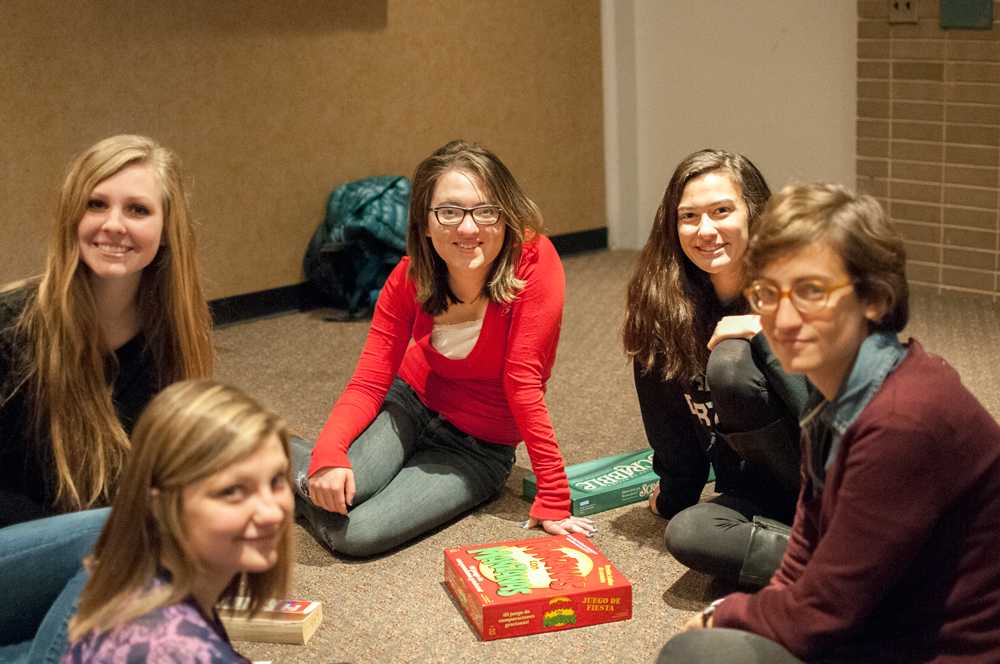International students found friends among each other during IntApp’s presentation of Boone Meets World: Global Perspectives Panel, which was held on Tuesday in the Price Lake Room of Plemmons Student Union.
As part of International Education Week, the panel involved eight exchange students answering moderated questions as well as questions from the audience about their experiences in the United States and specifically at Appalachian State University. Approximately 65 people attended.
“We are a student-run organization that works with international education and development, and one of our goals is to promote internationalization on our campus and this is one of those main events that we try to do that at,” said Allison Crook, a senior Spanish major and head of the business committee of IntApp.
Panelists spoke on what they missed about home, what other places in the United States they would like to visit and what significant events were taking place in their native countries.
The general consensus among the panelists about what they missed the most were friends, family and the cuisines typical of their country.
Doug Mulford, treasurer of IntApp and mediator of the event, asked the panelists what aspects of American culture they would like to incorporate in their home countries.
“I really like the easy lifestyle of being in Boone, said Katharina Doelp, a non-degree undergraduate student of Germany. “I think it’s probably not in all of America, but here in Boone everybody is easygoing, no one really cares about how I look.”
A couple panelists brought up things that many Americans might take for granted.
Fiona Kaniwboon of Thailand said she would like to incorporate America’s freedom of expression because Americans are more straightforward with their thoughts. Peter Onah Thompson, a political science graduate student of Nigeria said he would like to see an improvement in his country’s security.
“I’d like to incorporate freedom of speech in Nepal, because people usually cannot speak up,” said Shrwisha Pradhananga, freshman management major of Nepal. “There’s a huge case of sexism – there aren’t really feminists in my country. Girls are usually inferior [and] they are looked down upon.”
Another subject touched on was the difference between the education systems in the countries the panelists come from and the system in the United States.
Rafael Espinosa, a non-degree undergraduate student of Mexico said sometimes the public schools in his country might not even open due to protests and political issues.
Most panelists said they enjoyed the interaction between students and professors in the U.S., something that might not entirely be present back home.
“The biggest difference is, for me, with the education system and everything, is that here in class it’s a discussion,” said Hayden Reeves, a non-degree undergraduate student of Australia. “At home, you go, there’s 300 of us, it’s in a lecture theater, we do a two-hour PowerPoint presentation, you get your assignment, then you go home and you do it. I come over here and it’s such a big discussion and everybody gets to talk so much more in class.”
Pradhananga said she likes the applicable lessons she has learned at Appalachian, as opposed to the typical teaching style in Nepal.
“I like how practical the education is,” Pradhananga said. “It’s not just study, study, study, study. It’s more like group work, going out, exploring, looking at everything, but in Nepal, and in most Asian countries, what happens is it’s more theoretical.”
Several other events will occur throughout International Education Week, which will continue until Nov. 21. Some of the more notable events include the Appalachian Global Symposium, which occurred on Monday, Service Learning in Uganda and Culture Crawl: International Entertainment & Food, both of which will be Friday.
Story: Nicole Caporaso, Senior News Reporter

